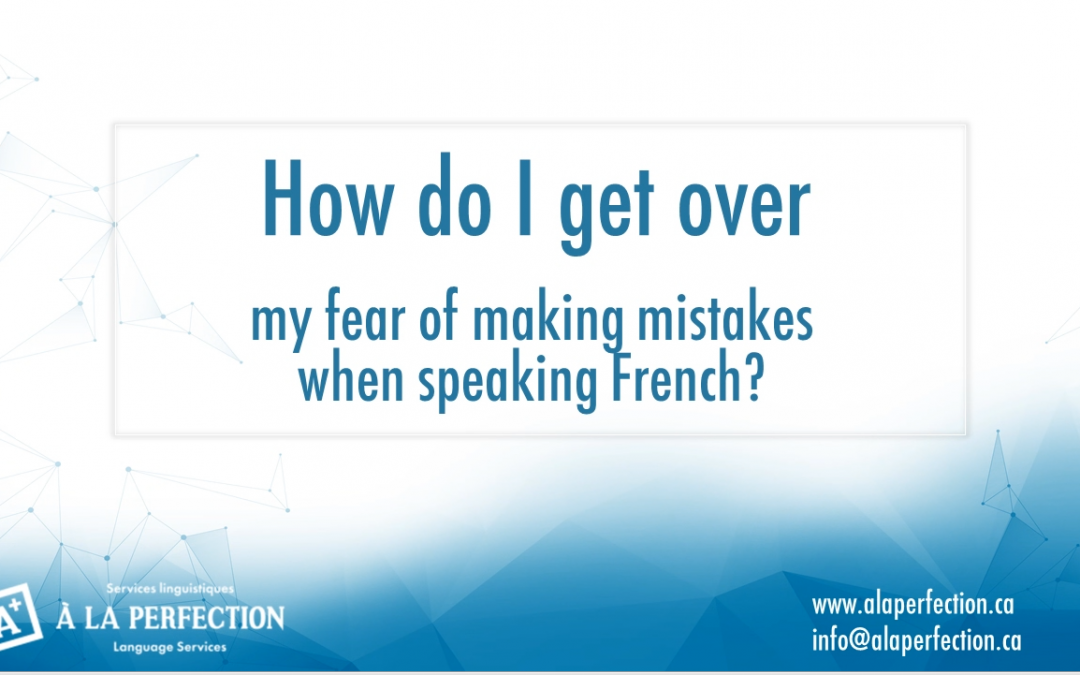How do I get over my fear of making mistakes when speaking French?
This is a question I get asked so often by my clients. You may be afraid of looking stupid or saying something “wrong” or the “wrong” way. I understand it can feel intimidating to speak with natives or more advanced learners but this is all part of learning a new language. Here are a few tips to help you get over your fear and jump in. You are likely harder on yourself than anyone else around you.
Making mistakes is part of the learning process
Successful language learners must be able to live with uncertainty. This means that you don’t have to understand exactly every word but the gist of what is said. They take risks and create opportunities for themselves.
Learning from your mistakes without beating yourself up about it is also important. You can reflect on what happened and try not to make the same mistake again. Focus on one issue at a time. Be proactive and seek help whenever you need it.
Attitude in language learning is actually more important than the grammar parts you will learn. So, guess what? Not only are you allowed to not be perfect, but that is pretty much part of your job as a language learner! Enjoy the experience first and foremost, the rest will come by itself.
Some people prefer to observe and listen before jumping in and it’s fine. I know, I was that way when I started learning English but with some confidence work, it is possible to conquer your fears.
There’s one factor we have to be conscious of in language learning called the Language Ego. As grown adults who can communicate confidently in our first language, the Ego stops us from making fools of ourselves and sees the stress-induced communication in a second language as a threat. This triggers the limbic system, our fight or flight instinct. Have you ever had that brain fog when you forget all the vocabulary words and grammar you knew when you are trying to speak? That’s exactly what that stress response does.
In order to be able to communicate confidently and effectively, you have to find a way to relax, step over that barrier and take risks. It could be to map out your sentences first to get a sense of control, learn the grammar parts you need to communicate in a given situation or work with a coach to build your confidence. Here are some tricks to help you get over your fears.
Create a persona
Just like with drama or roleplaying games, a persona can quiet the Ego since it is not « your ego » that is on the line. Creating a persona named Jacques or Isabelle may sound ridiculous at first but it is a good way to trick your brain and put a distance between the mistakes Jacques makes and your Ego. Detail that persona as much as possible, with where they are from, what their goals are and their background story.
You can also imagine yourself as a successful French speaker. What would be your habits? How would you feel having a long conversation in French in a café in Paris or hosting a business meeting in French in Quebec City?
Focus on meaning
Whether you are reading an article, listening to a TV show or having a conversation, communication is based on meaning. If you don’t understand a word that you feel is vital to your understanding, don’t hesitate to ask for clarification.
Otherwise, if you are trying to express a thought and the word doesn’t come to you quickly, use gestures or find other words to explain your thoughts. If you are talking with a more advanced learner or native speaker, listen to their response. You may learn a new word or expression.
To help you gather your thoughts and relax a bit so you can fully access all your knowledge, use fillers, like umm, take a deep breath, ask for a moment « un instant, s’il vous plaît ». It is okay to tell your conversation partner to give you some time, even if they would be tempted to switch to English to make it easier for you. Often times, bilingual people will switch to English because they think it will be simpler for you if the conversation happens in your native tongue, but taking learning into your own hands also means to let them know that you would like another 5 minutes in French to practice.
Ask for clarification
Each person has their own accent. Advanced learners and native speakers alike tend to speak very fast and may not be conscious of how difficult it is to understand. Even in English, if you meet someone from Newfoundland, the American Midwest or Australia, wouldn’t ask them to slow down as well so you can understand, even in your native language? It is not disrespectful to want to make sure you understand well.
Don’t hesitate to ask them to slow down « plus lentement, s’il vous plaît » or to repeat « Pouvez-vous répéter, répétez s’il vous plaît? ». If you want to apologize for not understanding, you can say it simply, « Je suis désolée, je ne comprends pas ». They may switch to English or they may take their time to explain it better.
Whenever we are in a stressful situation, our limbic system, our fight or flight instinct, kicks in. It was helpful when we were being chased by bears and whatnot, but our body’s response is to shut down everything that is not essential… and thinking of how to say a word in definitely not something essential if you have to run away.
The same goes if you have a presentation to make or are preparing for an interview. To help you take control on your stress levels and give you access to all the language knowledge that you have learned from school or training, try relaxing with breathing exercises, meditation and positive affirmations. You will find that it is much easier to access all that knowledge if you are relaxed.
Take learning into your own hands
Give yourself a break. Try being as relaxed as possible and you will see the huge difference in your learning process. Also learn to set up goals that are realistic and attainable to feel good about your learning process. Learn from your mistakes and celebrate your successes. It feels so much better to have a positive outlook on learning and your brain will thank you by allowing you to learn a lot more efficiently.
Why not have a glass of wine? Have you ever been to a club and suddenly feel like you can easily speak French after you’ve had a drink? Just like when you have a quick drink to be able to talk to that pretty girl or handsome guy at the bar, a bit of alcohol may relax your limbic system and allow you to feel more confident in your abilities. Just don’t go crazy there 😀
If you enjoyed this video and found it helpful on your language learning journey, please share with your friends and colleagues. You can also join the conversation on Facebook through The French Rendez-vous Network, a facebook group dedicated to supporting you on your journey to learn the French language.
Still with me? Great! Do you feel ready to start building your action plan? If the answer is ‘yes’, sign up for our free 3-day training to help you gain clarity on your goals and finally succeed at learning the French language.
If the answer is ‘no’, we’d love to hear your feedback. What have we missed in our attempt to help you take that first step? What obstacles might we have overlooked? Are you ready to set up take the next step to help you learn French?
Ready to take the leap and crush your language goal? Book your FREE consultation here!

